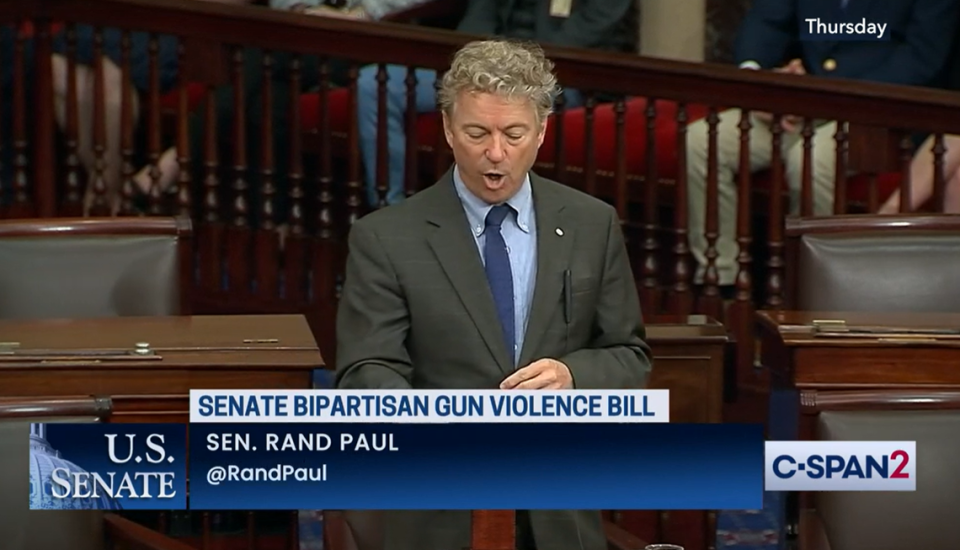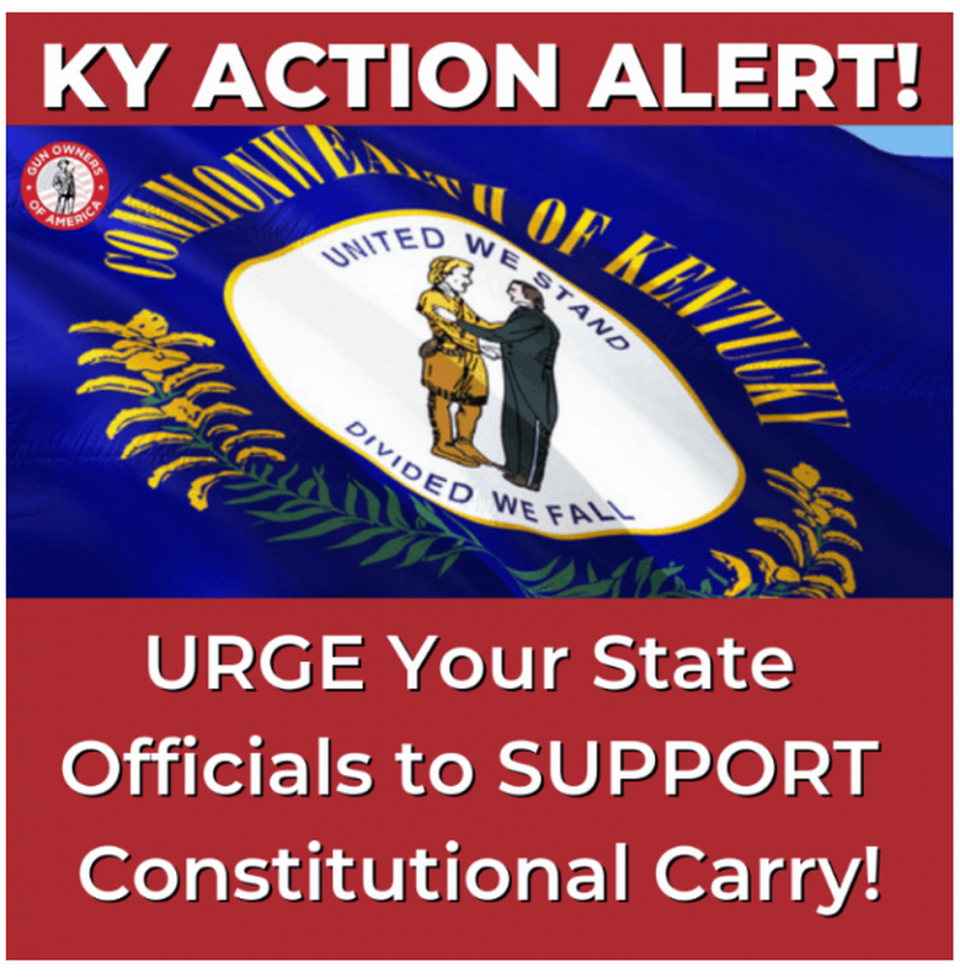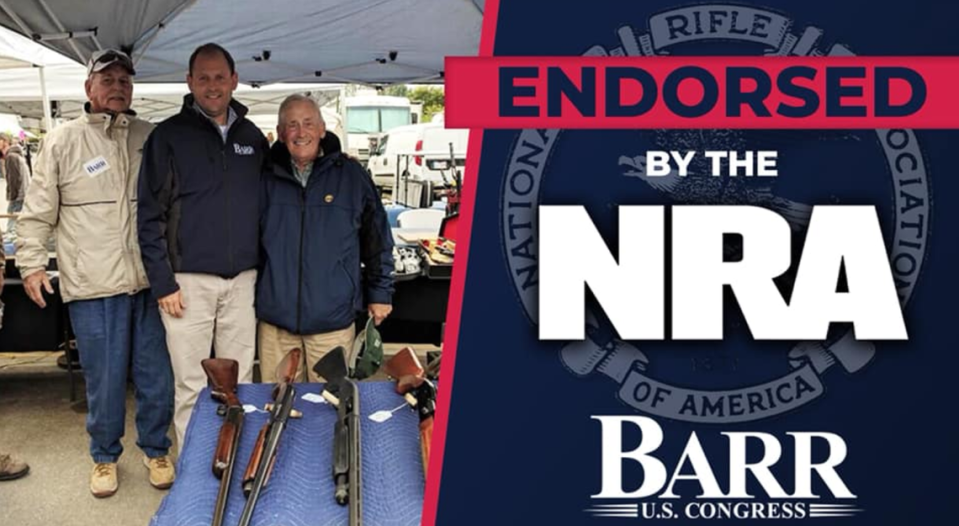KY politicians took $232,344 in PAC money from gun rights groups over last 10 years
- Oops!Something went wrong.Please try again later.
- Oops!Something went wrong.Please try again later.
- Oops!Something went wrong.Please try again later.
- Oops!Something went wrong.Please try again later.
The political action committees of gun rights organizations gave at least $232,344 to Kentucky politicians over the last 10 years, nearly all of it to Republicans who dominate the state’s political agenda and usually oppose gun control, according to a review of federal and state campaign-finance data.
The Herald-Leader reviewed the data following the April 10 mass shooting at Old National Bank in downtown Louisville that left five people dead and eight more wounded. Police say the gunman — a bank employee — legally bought his AR-15 rifle at a local dealer the previous week.
The largest gun rights donations, given since the 2012 election cycle, went to Kentucky’s congressional delegation, including U.S. Senate Minority Leader Mitch McConnell ($55,900), U.S. Sen. Rand Paul ($47,794) and U.S. Rep. Thomas Massie of Vanceburg ($42,500).
Smaller totals went to U.S. Rep. Andy Barr of Lexington ($24,450), U.S. Rep. Hal Rogers of Somerset ($23,500), U.S. Rep. James Comer of Tompkinsville ($12,450) and U.S. Rep Brett Guthrie of Bowling Green ($10,500).
A relatively modest sum ($15,250) could be traced to state-level politicians, including former Republican Gov. Matt Bevin ($3,000), the Kentucky Republican Party ($3,250) and several leaders of the GOP-majority legislature, including House Speaker David Osborne, Senate President Robert Stivers and Senate Majority Leader Damon Thayer ($1,000 each).
The PACS represented an assortment of groups with an interest in gun rights: the National Rifle Association, Gun Owners of America, Safari Club International, the National Shooting Sports Foundation, the National Association for Gun Rights, the Ohio Gun Collectors Association, the Dallas Safari Club, Delta Defense LLC and Eagle Gun Range.
The only Democrat in Kentucky’s congressional delegation, U.S. Rep. Morgan McGarvey of Louisville, elected last November, reported $1,000 donations from two gun control groups, Everytown for Gun Safety and the Giffords Law Center to Prevent Gun Violence.
Gun control usually loses
Both the gun rights organizations and the Kentucky politicians they support tend to oppose the sorts of gun control measures proposed in Washington and Frankfort after mass shootings, although there are rare exceptions.
In June 2022, after 19 children and two adults were shot to death at an elementary school in Uvalde, Texas, Congress passed the Bipartisan Safer Communities Act.
The bill’s many provisions included enhanced juvenile background checks for gun buyers under age 21; funding for states to implement “red-flag” laws allow officials to temporarily take guns from people judged by courts to be too dangerous to have them; more money for mental health programs and school security; and a tighter federal ban on domestic abusers buying firearms, which is sometimes referred to as closing the “boyfriend loophole.”
In the House, all of Kentucky’s congressmen voted against the bill except for the one Democrat at the time, John Yarmuth of Louisville.
In the Senate, McConnell voted for it (angering at least one gun rights group, Gun Owners of America, which called him a “turncoat”) while Paul opposed it. Among Paul’s objections was funding for red-flag laws, which he said violate the Second Amendment rights of citizens based on suspicions of future misconduct.
“Many people who are red-flagged will have committed no crime,” Paul said on the Senate floor. “There will simply be, like Philip Dick’s (John) Anderton, people who might commit a crime or might be a danger to someone.”

However, the Bipartisan Safer Communities Act was unusual, coming after high-profile gun massacres not just in Uvalde but also at a Buffalo, N.Y., supermarket and a medical building in Tulsa, Okla. Measures opposed by gun rights organizations seldom pass in Congress and almost never in the Kentucky General Assembly.
More common are the many failed bills, like the Active Shooter Alert Act of 2022, which would have required the U.S. Department of Justice to organize, with local authorities, a network of real-time alerts to warn the public about active shooter incidents happening in their communities.
Among the gun rights organizations urging lawmakers to oppose the shooter alert bill, Gun Owners of America called it “an anti-gun propaganda program intended to further public hysteria.”
That bill passed the House but stalled in the Senate. Of Kentucky’s House delegation, only Rogers and Yarmuth supported it. Barr, Comer, Guthrie and Massie voted no, with Massie arguing that shooter alerts would needlessly inflame communities against guns.
“What about violence committed with a car, violence committed with a knife?” Massie asked in a House floor speech.
“No concern for that,” Massie continued, “because the true purpose here today is to scare people on their phones. They can’t get away from their phones. It is going to be popping up, saying ‘Be afraid! Somebody’s got a gun!’ And they are going to try to condition the American people to ask to repeal the Second Amendment.”
Not just PAC money
After a mass shooting like the one in Louisville, the news media often reports on how much money politicians take from gun rights organization PACs.
But policy-making experts say PAC money only tells a part of the story.
For one thing, they say, there are federal and state limits on how much money a PAC can donate to any individual politician — in many instances, $5,000 per election for federal offices — so the PACs are just one source of campaign support on the gun issue.
To get a fuller picture, the nonprofit Center for Responsive Politics analyzes campaign donations not just from the gun rights organizations but also from individuals who contribute to those groups’ PACs and then to politicians, on the assumption that their donations to politicians are motivated, at least in part, by their interest in gun rights.
Based on this “ideological coding” of individuals, the Center says, Rand Paul took $263,680 over the last 10 years from donors with an interest in gun rights. Most of that money came from individuals, not PACs, the Center says. McConnell’s 10-year donation total under this analysis was $124,609.
That’s nearly four times more money than just the PAC donations to the senators.

However, it’s the strength of a deeply engaged membership, more than donations, that gives power to gun rights organizations, say those who study the politics behind the gun debate.
Although the NRA, Gun Owners of America and other groups do send out checks in election years, they also closely monitor all gun legislation moving through Congress and the 50 statehouses. Through newsletters, email and texts, they advise their millions of dues-paying members which candidates to back and which to defeat and when to call lawmakers to demand action on pending bills.
In Kentucky, conservative politicians actively seek an endorsement from the NRA that can be displayed in their campaign materials. Andy Barr, for example, has touted his “A” rating from the NRA, which he earned for supporting the right to carry concealed guns and opposing the United Nations Arms Trade Treaty, among other actions.

While opinion polls show roughly half of Americans favoring stricter gun laws, groups advocating gun control don’t have anywhere near as much political clout as their opponents, experts say.
“Gun rights organizations have greater resources and membership than gun control organizations,” University of Louisville political scientist Melissa Merry wrote in her 2020 book Warped Narratives: Distortion in the Framing of Gun Policy.
“The NRA is the ‘go-to organization’ for journalists seeking comment on gun policy-related matters and is ranked by Washington political insiders as one of the most powerful lobbying groups,” Merry wrote.
“Further, gun rights organizations have been more successful than their gun control counterparts in mobilizing their supporters — getting them to attend public meetings, contact elected officials and vote, among other actions.”

